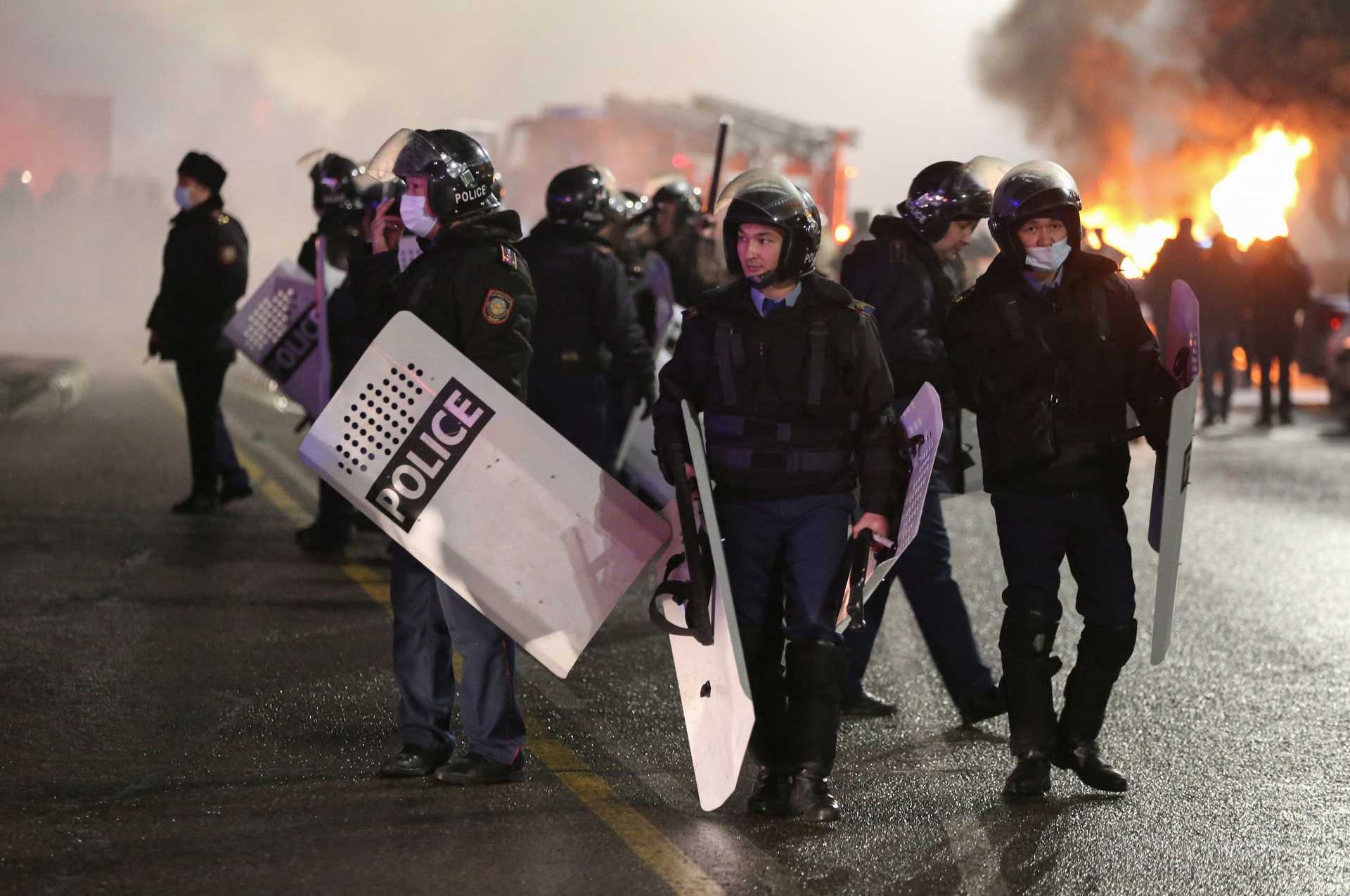What is happening in Kazakhstan?
A short note reflecting recent resistance and state repression in Kazakhstan.

From Eurasianet:
This story was originally written by Joanna Lillis and published by Eurasianet.
-
On February 7, workers rallied outside an energy facility in western Kazakhstan that is owned by a subsidiary of Kazatomprom, the state-owned nuclear company, as negotiations to resolve a pay dispute floundered. The latest bout of industrial unrest broke out in the oil-rich Mangystau Region, where peaceful protests against fuel price rises began in early January before snowballing around the country and ending in violence.
On January 25 workers from the MAEK-Kazatomprom energy plant put forward a demand to double their pay. The company rejected it, on the grounds that it cannot afford the pay hike. It offered instead a 30 percent raise for all staff except managers, plus other concessions including bonuses paid out on public holidays. Workers’ representatives on a reconciliation committee rejected the offer.
Staff staged a protest rally on February 3 outside the plant, which is headquartered in the city of Aktau and supplies electricity, heating and water to the region. Workers also penned a direct appeal to Tokayev complaining that in the face of rampant inflation they cannot live on their salaries, which they said average just 140,000-160,000 tenge ($325-370). That is way below the national average salary of 268,051 tenge ($600). It is also below the average for Mangystau Region, which officially stood at 350,000 tenge at the end of last year.
Video published by local newspaper Lada showed workers cooking food under a large tent they had erected, indicating that they may plan to picket the facility indefinitely.
This is only the latest industrial unrest to break out in Kazakhstan, where low salaries were a key grievance fuelling the protests in early January.
Oil workers in western Kazakhstan went on strike at the time in solidarity with protesters, as did workers at the Kazakhmys copper producer in the south-east of the country. More recently, strikes demanding pay rises have erupted among anyone from telecoms workers to ambulance drivers and firefighters. Couriers working in the gig economy have also threatened action over claims of deteriorating pay conditions.
From The Diplomat:
This article was originally written by Paolo Sorbello and Almas Kaisar and published by The Diplomat.
-
The January fuel protest that started in Mangystau Region had quickly spread across the country, as people demanded better living conditions. Clashes between security forces and protesters caused massive urban violence in Almaty, Kazakhstan’s largest city, 1,200 miles to the east of Zhanaozen. The official tally of 240 dead and thousands injured across the country could well be an underestimation.
Also underestimated was the body count of the clashes that occurred in Zhanaozen in 2011, when the authorities violently quashed an oil worker strike that had lasted for eight months. Before this year’s “Bloody January,” mentioning the name Zhanaozen was a reminder of the 2011 national tragedy. Worker disputes and demands for fair employment policies have continued since 2011.
The situation in the region presents few prospects to these workers, mostly men, who were able to pay off their debts and buy houses, but could not find a satisfactory job outside the extractive market, already clogged by the overstaffing at national companies and worsening conditions at private service enterprises.
From Radio Free Europe / Radio Liberty:
This article was originally published by RFE/RL.
Copyright (c)2020 RFE/RL, Inc. Reprinted with the permission of Radio Free Europe/Radio Liberty, 1201 Connecticut Ave NW, Ste 400, Washington DC 20036.
-
Sixteen men arrested in a northeastern Kazakh city during the January protests have launched a hunger strike to protest the conditions they are held in and a court’s decision to extend their pretrial detention.
Anar Qusaiynova, a lawyer representing them, told RFE/RL late on April 7 that the 16 detained men had started their hunger strike the day before.
According to Qusaiynova, the men are demanding to be transferred to house arrest and their cases brought to court quickly.
Nazira Zhylqyshynova, the mother of 24-year-old dentist Nursultan Sultanov, one of those detained and on hunger strike, told RFE/RL that the conditions in the city’s central detention center, which is situated in an 18th-century fortress, were “horrible.”
“I visited the place to see my son. It’s very damp and humid inside. It’s probably dangerous for anyone’s health. We demand that our sons be released. They have families, mortgages. They will not go anywhere before the trial,” Zhylqyshynova said.
Relatives of another man on hunger strike, Semei Ismaghambetov, told RFE/RL that all 16 men were being kept in one cell.
Kazakh authorities say at least 230 people, including 19 law enforcement officers, were killed during the January violence, but human rights groups say the number of those killed was much higher, pointing to evidence that there were peaceful demonstrators and people who had nothing to do with the protests among those killed by law enforcement and military personnel.
Authorities say some 800 people have been arrested over the unrest and dozens have been sentenced to various prison terms. There are reports that those in custody have been tortured by the police.